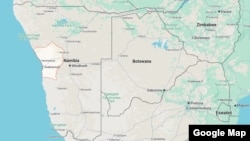Namibian activist Jimmy Areseb appeared in court Monday after being arrested for allegedly violating public order laws during a protest at a local traditional authority’s offices. Areseb and others at the rally accused officials of accepting bribes from a Chinese mining company in return for access to lithium deposits. The confrontation highlights growing tensions in Namibia’s Erongo region, where activists say the Chinese company, Xinfeng, is acting illegally.
Images of an elderly woman being carried off by members of Namibia’s paramilitary Special Field Force on Saturday set the Namibian social media space abuzz, with some comments likening it to the apartheid era when the country was controlled by South Africa.
In another circulating video, members of the widely feared police unit are seen confronting elderly men and women who had gathered at offices of traditional chiefs and councilors, whom they accuse of allowing the Chinese company Xinfeng permission to mine for lithium without following the proper channels and procedures.
The tensions at Uis, a mining settlement in the mineral-rich Erongo region, culminated in the arrest of activist Jimmy Areseb for interfering with the Special Field Force, who were enforcing a court order for demonstrators to vacate the offices where they had camped for a week demanding to see the chief.
At the center of the storm is Xinfeng, a company that Namibia’s commissioner of mines has charged with illegal mining.
Community members are asking why police arrested Areseb but not anyone from Xinfeng.
Speaking to VOA, police spokesperson Kauna Shikwambi said the two cases cannot be compared.
“Those, were obstructing officers, right there at the scene, now. The other one requires investigation, and there must be evidence, that’s why investigations take so long, to have evidence, that indeed an arrest can be affected or not. You can never compare that and that! It doesn’t make sense,” said Shikwambi.
Xinfeng is accused by the activists of paying bribes to the chiefs, in order to gain consent for the mining.
However, a Xinfeng spokesperson, Kuvee Kangueehi, said those claims are false. He said the company makes a contribution of about $550 per month to the traditional authority as part of its corporate social responsibility and this is being misconstrued by the community as a bribe.
“EPL’s, and mining claims, and all the rights are granted by the Ministry. So for what reason will Xinfeng bribe an entity that does not grant the license? And it’s not in the business of Xinfeng to bribe anybody,” he said.
Local chief Sagarias Seibeb, who is being accused of turning a blind eye to the interests of his community in favor of the Chinese company, told VOA the people camping at his office, including Jimmy Areseb, are his in-laws.
He said family members feel they are not benefiting from his position as a chief, and are using the Xinfeng issue to settle family disputes.
“I cannot deny someone access to do prospecting, or whatever, in my area. I am just a custodian of the area. The land belongs to the state and there is a section that deals with that consent letter, and that can be done with or without my consent letter,” said Seibeb.
On Tuesday, the chief is to meet with protesters in the presence of police officers and officials from the central government to try and find a solution to the tensions troubling the community.
Meanwhile, police say they are investigating the charge against Xinfeng.




